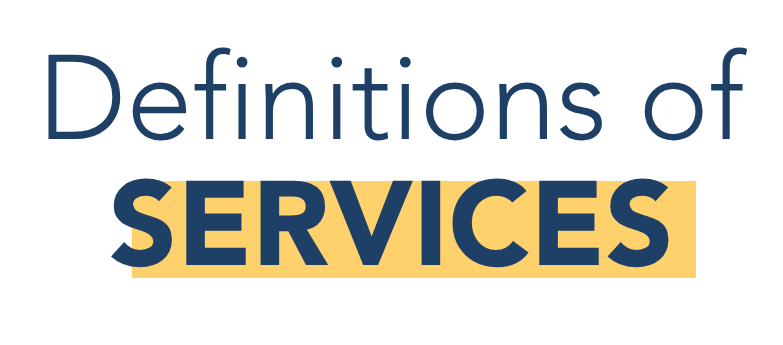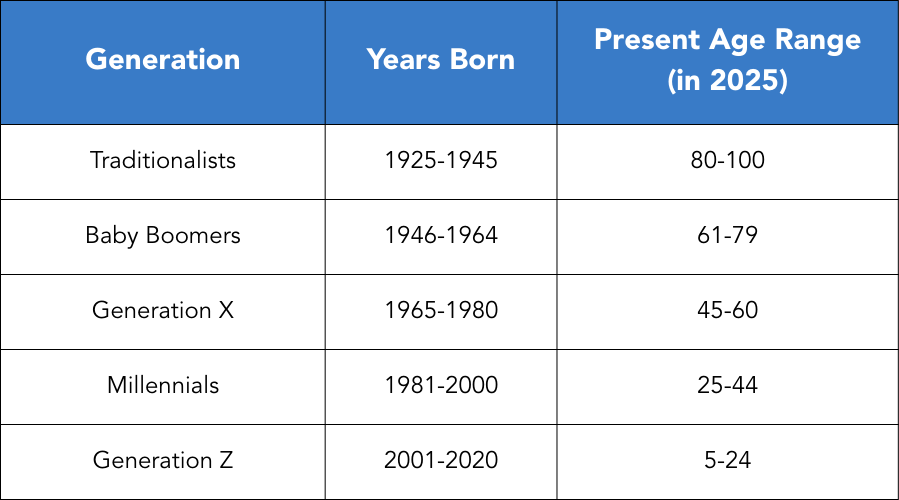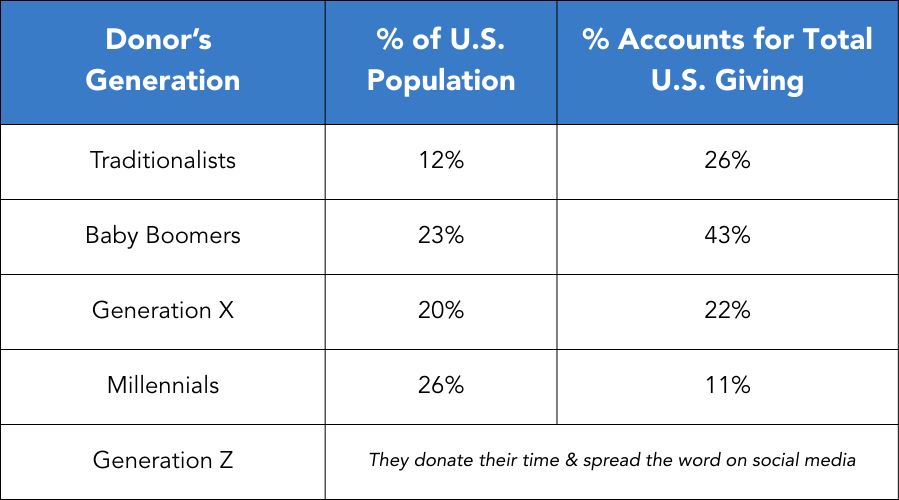Rachel Deffenbaugh
Definitions for Services

Within the pregnancy help movement, terminology can vary across organizations, reflecting the distinct approaches and needs of each community. While this diversity is a strength, terminology differences can sometimes lead to confusion or misreporting, especially when completing forms or reporting data. If one organization uses a different term for a service than what's listed on a form or report, they might mistakenly indicate they don’t offer that service—when in fact, they do. Clear, shared terminology—or at least an understanding of equivalent terms—is essential to ensure accurate reporting and consistent communication.
completing forms or reporting data. If one organization uses a different term for a service than what's listed on a form or report, they might mistakenly indicate they don’t offer that service—when in fact, they do. Clear, shared terminology—or at least an understanding of equivalent terms—is essential to ensure accurate reporting and consistent communication.
To make the application process smoother and avoid confusion, we’ve put together a list of common terms and what they mean, sorted by priority and frequency of client requests.
When checking services on the application, please use the definitions below to select the services your organization directly provides:
- Pregnancy Tests (Medical Service) - Testing for hCG levels in urine and/or blood (Urine hCG Pregnancy test; serum hCG pregnancy test)
- Self-Pregnancy Testing - Client performs urine pregnancy testing independently without medical oversight
- Ultrasound Services (On-site) - Offers ultrasounds to confirm pregnancy
- Ultrasound Referral in partnership with other clinics - Offers referral for ultrasound with another clinic or physician, either on-site or at another location
- Mobile Unit (Medical/Consulting) - Mobile medical unit offering ultrasounds and options consulting
- Prenatal Care (On-site) - Offers prenatal medical care on-site
- STI Testing (Medical Service) - Testing for particular STIs
- STI Treatment (Medical Service) - Treatment for particular STIs
- Maternity Housing - An organization providing residential care for expectant and/or parenting mothers and their children.
- Free Maternity and Baby Supplies - Free supplies may include maternity items, diapers, wipes, formula, baby clothing, and various baby items
- Pregnancy Options Consulting - Offers clients education and consultation services discussing pregnancy options
- Abortion Recovery - Can include resources, counseling, support groups, and/or educational resources to help women and men find healing after an abortion
- Medical Care Following Chemical Abortion - Offering medical care to women after a chemical abortion, including assessment and/or ultrasound
- Telehealth - Using digital technologies to deliver life-affirming healthcare services remotely, including telemedicine (e.g., pre- and post-abortion assessments/consultations, APR, patient education, and remote vital signs monitoring, etc.)
- Telecare - Using digital technologies to deliver pregnancy help services to empower clients to embrace life-affirming choices remotely, including virtual initial client intake and ongoing support (e.g., intervention appointments, options education/consulting, parenting classes, relationship/life skill coaching, etc.)
- Incentive Programs - Educational classes incentivized by material assistance (a.k.a. earn while you learn program)
- Parenting Classes - Provides classes to empower moms and dads on their parenting journey
- Childbirth Preparation Classes - Provides classes in preparation for childbirth
- Adoption Agency (On-site) - Legally authorized to facilitate adoption placements
- Adoption Information - Provides education on the adoption process and referrals to adoption agencies as needed
- Well-Woman Visits - Routine medical care for clients, such as yearly gynecology and pap tests
- Men’s Program/Mentorship - Offers support, education, and resources to expectant and parenting fathers, empowering them to navigate fatherhood with confidence
- Community Referrals/Networking - Provides referrals for community resources, which may include housing, healthcare, food pantries, professional counseling, childcare, legal assistance, and more
- Perinatal Hospice - Offers support to families who choose to continue a pregnancy after receiving a life-limiting prenatal diagnosis
- Sexual Health Program - Offers clients education and consultation services discussing sexual health, which may include abstinence, fertility awareness, STIs, and more
For questions, please email This email address is being protected from spambots. You need JavaScript enabled to view it..
Last updated May 2025
Advocate for Life
Option Line: Find 24/7 Pregnancy Help
Bilingual pregnancy help, plus real-time connections to nurses for telehealth consultations and to Heartbeat’s 3,800+ pregnancy help organizations worldwide.
Use the zip code locator at OptionLine.org to identify local pregnancy help locations.
Maternity Housing Coalition
Find housing availability nationwide for women. Plus, stay up-to-date on the 50+ new maternity housing programs launching in the coming year through the Heartbeat network.
Prenatal Diagnosis
Help families experiencing pressure to abort following an adverse prenatal diagnosis find life-affirming medical help 24/7 and personal support through local parent care coordinators.
Abortion Pill Rescue® Network
Direct those considering or who regret starting a chemical abortion to immediate medical help for Abortion Pill Reversal worldwide.
PregnancyHelpNews.com
Follow the latest news of global pregnancy help and stories of hope.
PregnancyHelpPodcast.com
Subscribe for updating and equipping in your pregnancy help work.

MHC Regional Event - OH


Co-hosted by MHC & Hannah's Home
Join us for our next regional event for maternity housing organizations!
WHERE
Hannah’s Home
8525 Lakeshore Blvd #1516
Mentor, OH 44060
WHEN
Monday, July 21, 2025
10 a.m. - 3 p.m.
Come at 9 a.m. for coffee and networking
Lunch provided.
Statistics Show 7k+ Lives Saved Through APRN

We're so excited to announce a new milestone for the Abortion Pill Rescue® Network! Join with us as we celebrate the life-changing and life-saving work of APRN:
Click here to learn more about this life-saving process and the families it has saved.
Parenting Through the Pain: Why Mothers with High ACE Scores Need Specialized Support
by Valerie Harkins, Executive Director of the Maternity Housing Coalition
For many single mothers in maternity housing, the road to healing is not only physical and practical but deeply emotional and spiritual. When a mother carries the weight of a high ACE (Adverse Childhood Experiences) score, she often brings a silent history of trauma that shapes how she parents.
As leaders in the maternity housing field, we must recognize this foundational truth:
You cannot give what you’ve never received.
This is especially true when it comes to emotional presence and nurturing love. For mothers who never experienced consistent affection, safety, or attuned care in childhood, offering those things to their baby can feel unnatural, overwhelming, or even impossible.
Why ACE Scores Matter in Parenting
The ACE study revealed a powerful connection between early childhood trauma and long-term outcomes in physical health, emotional well-being, and relational stability. A high ACE score often indicates exposure to abuse, neglect, addiction, mental illness, or violence in the home. These experiences rewire the brain and nervous system, making it difficult for someone to regulate emotions, feel safe in intimacy, or form secure attachments.
In parenting, this trauma can surface in subtle but significant ways. For instance, a mom may:
- avoid eye contact with her infant, feeling uncomfortable with the intimacy of being seen
- scroll on her phone for extended periods while her baby plays or cries nearby, using distraction to numb her own anxiety or dissociation
- leave the baby in the crib for excessive amounts of time, unsure how to interact or fearing that her presence won’t matter
- grow unresponsive to crying, not from neglectful intent, but because the sound triggers panic, shame, or helplessness
These behaviors are not signs of indifference; they are symptoms of deeper pain. They point to a mother doing the best she can with what she’s experienced—and often, that experience lacked nurture.
Parenting with an Insecure Attachment Style
Secure attachment develops when a caregiver consistently responds to a child’s needs with warmth, predictability, and attunement. But when a mother has an insecure attachment—whether avoidant, anxious, or disorganized—she may:
- Struggle to identify and respond to her child’s needs in real time.
- Feel emotionally flooded or numb in moments of closeness or distress.
- React to her baby’s crying with frustration, shutdown, or withdrawal.
- Feel uncomfortable offering affection, believing her presence may do more harm than good.
Attachment-based parenting isn’t about perfection—it’s about emotional presence. But for mothers with a high ACE score, presence itself can be terrifying.
This is where specialized support becomes critical.
What Is PCIT: Parent-Child Interaction Therapy?
One powerful, research-backed model that helps mothers break through emotional barriers is Parent-Child Interaction Therapy (PCIT). PCIT is a therapist-guided program where moms are coached in real-time while interacting with their child. It focuses on two major goals:
- Strengthening connection through praise, reflection, and engagement
- Improving discipline through consistent, calm, effective responses
Mothers often learn, sometimes for the first time, that they can be nurturing, present, and effective parents. They are praised for connecting, not just correcting—and that affirmation can be life-changing.
Practical Takeaways for Maternity Homes and Advocates
-
Prioritize Trauma-Informed Parenting Education
Equip staff, volunteers, and mentors to understand ACEs and how trauma may show up in parenting behaviors. Normalize the struggles without minimizing the importance of growth. -
Recommend Programs Like Mom Power
Mom Power is a 10-week, evidence-based group program that combines attachment-based parenting education, stress reduction, and peer support. It’s designed for trauma-impacted mothers and helps build a foundation of emotional safety—for both mom and child. -
Encourage Studying Attachment Styles
Help mothers learn about their own attachment style and how it impacts parenting. This self-awareness can open the door to compassion and change. -
Model Compassionate Curiosity
When a mother seems emotionally distant, disengaged from her infant, scrolling through her phone during feeding, or unmoved by her baby’s cry, assume discomfort, not apathy. Connection is often uncomfortable before it becomes healing. -
Remind Moms of God’s Healing Love
As Christian leaders, we believe no story is too broken for redemption. Remind mothers: “We love because He first loved us” (1 John 4:19).
The love of Christ is the model and source of our ability to offer love, even when it wasn’t modeled for us.
Parenting education for mothers with high ACE scores is not about fixing “bad behavior.” It’s about healing wounds that were never meant to be carried into motherhood. It’s about offering grace, not guilt, and equipping mothers to give what they are only just beginning to receive: emotional presence, secure love, and godly connection.
For more information on implementing trauma-informed parenting support in your maternity home or connecting with trusted program providers, This email address is being protected from spambots. You need JavaScript enabled to view it. to our team today.
______________________
Sources
https://www.cdc.gov/violenceprevention/aces/index.html
https://www.ajpmonline.org/article/s0749-3797(98)00017-8/pdf
Online Course: Blueprint for Starting Your Maternity Home

Beginning July 1
Duration: 6 Weeks | 6 Modules + LIVES on Fridays*
Hosted by: The Maternity Housing Coalition
About This Course
Are you thinking about starting a maternity home but aren’t sure where to begin? Blueprint for Starting Your Maternity Home is a comprehensive 6-week course designed specifically for pregnancy help organizations ready to take the next step in serving women facing unplanned pregnancies.
This foundational course walks you through the critical components needed to launch a successful and sustainable maternity home. Through six focused modules, you’ll gain the tools, strategies, and confidence to move from vision to action.
What You’ll Learn
-
Week 1: Starting Point
Clarify your "why," explore different maternity home models, and assess your readiness for this important work. -
Week 2: Board Model & Responsibilities
Learn how to structure a strong, mission-driven board and define its essential roles in governance and support. -
Week 3: Structuring the Home
Conduct a needs assessment, craft a compelling mission statement, and begin developing a framework that reflects your community and values. -
Week 4: Building & Maintaining a Team
Discover how to recruit, train, and sustain a healthy and effective team of staff and volunteers. -
Week 5: Property Considerations
Understand zoning laws, location requirements, safety standards, and other key factors when choosing and preparing your property. -
Week 6: Resident Care
Learn best practices for supporting residents through case management, program development, house guidelines, and holistic care.
*Plus, join us live each Friday for a discussion of that week's topic and a Q&A. This is the perfect time for participants to ask questions and join an open forum with other start-ups.
Whether you’re in the early stages of praying for this mission or already gathering a team, this course equips you with the practical knowledge and strategic insight to launch a maternity home that makes a lasting impact.
Heather and Lane
HEATHER'S STORY
Lane — Born February 2025
My mom actually planned on getting an abortion with me in 1992 due to an unplanned pregnancy. She went to Save a Life in her town and decided not to abort me. I ended up being an only child. I grew up very prolife and had a baby at 18. I later had 2 more children with my now ex-husband before our divorce in 2023. I ended up unexpectedly pregnant again at 32 years old and was terrified. Me and Lane’s dad had a very toxic relationship, and I was scared of being a single mom of 4 kids.
I took the first of the abortion pills, and it was instant regret. I went to get an ultrasound the next day to check on him, and when I saw he had a heartbeat, I immediately contacted APR to save my baby.
His dad abandoned us for most of my pregnancy, and I went through it alone as a single mom. I am an RN and worked 2 full-time jobs to save for my maternity leave.
In January, I went into preterm labor at 31 weeks and ended up in the hospital for 3 weeks. Lane was born 6 weeks early on 2/3/25 and had a 19-day NICU stay.
Even with all the absolute torment and trauma his dad has put me through, I DO NOT regret my decision for 1 moment.
God knew I needed this little boy, and I am SO INCREDIBLY THANKFUL for him.
I am so thankful for my baby and for the donors who make APR possible.
I know that Lane is here for a reason.
He has survived through a Plan B, abortion pill, subchorionic hemorrhage, and preterm labor.
I believe God has big plans for his little life, so please share so our story can have meaning and hopefully help other women who wish to reverse their decisions made out of fear.
The devil is a liar, and we have made it through every single struggle. Abortion for me was a decision made out of fear, BUT GOD has seen us through physically, emotionally, mentally, spiritually, AND financially.
There is still so much ahead for us, but also so much hope.
If the abortion had been successful, then I would’ve had a secret.
Instead, God has given us a story.
And I’m so so thankful <3
2025 Keynote by Dr. Peggy Hartshorn
How Fragile Is Your Donor Database?
by Bryan Gonzalez
In the next 20 years, about $84 trillion will change hands. As an article from CRM giant, Bloomerang, suggests, “...there are only three places where dollars can go — loved ones, government, or charity.”
While I certainly want to advocate that some of this $84 trillion goes towards the many wonderful charities in the pregnancy help movement, in this article, I want to focus on the reality that, in the next 20 years, many of our top donors will have passed away.
So, the question I want to ask is: How fragile is your donor database? Are you prepared for many of your top donors to pass away?
Exercise
Let’s do a quick exercise:
- Write down a list of your top 40-50 donors. Or, maybe you need to use your donor database to run that report. (Wait, do you know how to do that with your donor database?)
- Now, with that list on your screen or on a piece of paper in front of you, write the ages of those donors. (Wait, do you know how old your donors are?)
- Then, categorize how many of your donors are in the generally accepted generational cohorts:

Having older donors is not necessarily a problem in the short term, but how many of those Generation Xers are poised to replace the Baby Boomers and Traditionalist donors as they are passing on in the next 20 years? And, are we planting seeds with the Millennials to contribute more significantly in the next 5-10 years?
If a donor gives from his business or company, but then passes away, will his company continue to donate? I would suggest having conversations with the donor about his legacy, or begin talks with the next generation of leadership about continuing the donor’s legacy even after he is gone.
Naturally, this will lead to conversations about estate planning or possibly a planned gift, and that’s certainly important in fundraising. However, the exercise this month is to determine how fragile your database is, so that you are better poised to react to seismic shifts in your donor database in the not-too-distant future.
Here are some final stats to noodle over:

(Apparently, the math doesn’t add up, but I just took numbers from the website. Regardless, you get the general idea.)
Practical Tip:
Based on this information and your analysis of your database, can you now answer the question: How fragile is your donor database?
ICYMI: March 2024, Stay Hungry
___________________________________________________________________________
*Do you have topics you’d like me to write on or have comments/feedback on my articles? Please send me an email at This email address is being protected from spambots. You need JavaScript enabled to view it.
2025 Advocate for Life!
Option Line: Find 24/7 Pregnancy Help
Bilingual pregnancy help, plus real-time connections to nurses for telehealth consultations and to Heartbeat’s 3,800+ pregnancy help organizations worldwide.
Use the zip code locator at OptionLine.org to identify local pregnancy help locations.
Maternity Housing Coalition
Find housing availability nationwide for women. Plus, stay up-to-date on the 50+ new maternity housing programs launching in the coming year through the Heartbeat network.
Prenatal Diagnosis
Help families experiencing pressure to abort following an adverse prenatal diagnosis find life-affirming medical help 24/7 and personal support through local parent care coordinators.
Abortion Pill Rescue® Network
Direct those considering or who regret starting a chemical abortion to immediate medical help for Abortion Pill Reversal worldwide.
PregnancyHelpNews.com
Follow the latest news of global pregnancy help and stories of hope.
PregnancyHelpPodcast.com
Subscribe for updating and equipping in your pregnancy help work.














